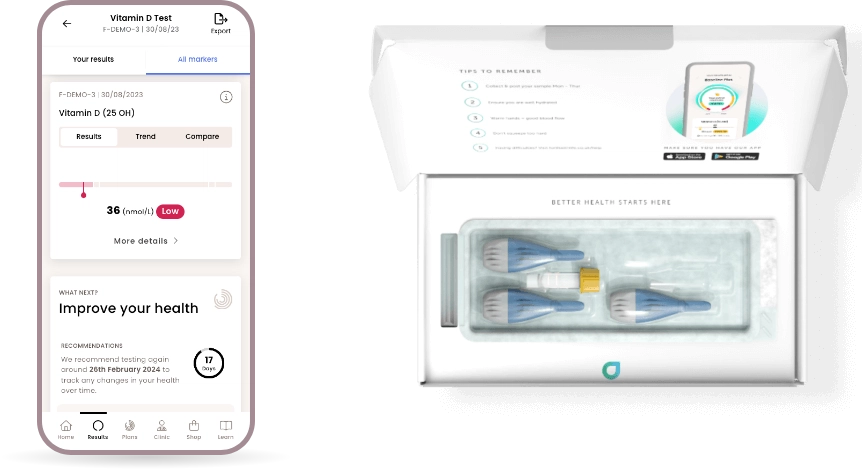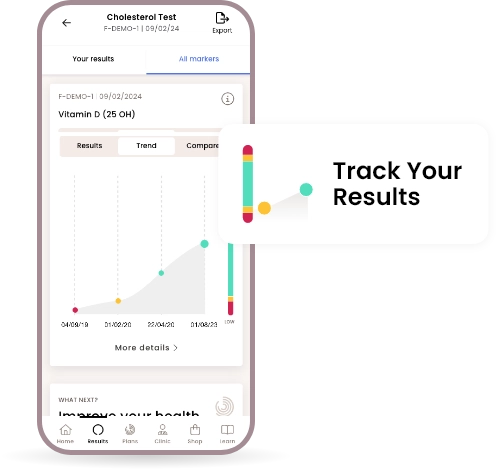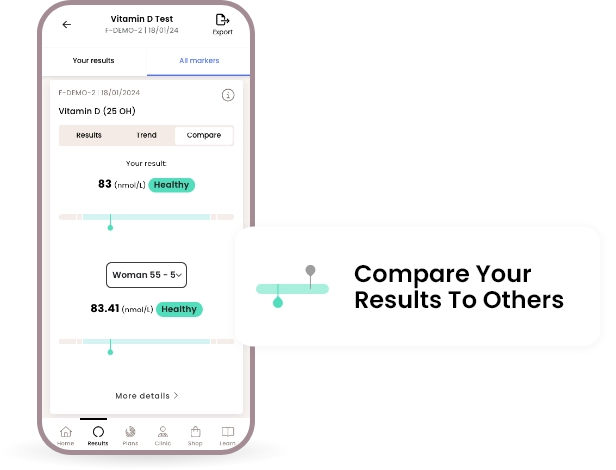About flexible subscriptions
How does a subscription work?
When you purchase this test subscription plan, we will automatically send you another test kit in a few months. Don't worry - you have full control over when this will be, and you can change/cancel it anytime.
When you first purchase this test, you can choose your subscription options in the checkout. We do this, because we recommend taking multiple tests over time to track how your biomarkers change. You'll be charged per test kit (rather than monthly, for example).
Why subscribe to multiple tests?
One test will show you what areas you need to focus on, continued testing will help you learn how your training, diet and lifestyle is impacting your health.
How often should I test?
We recommend a follow up test 3 months after your first test, followed by a test every 6 months depending on your results, but its up to you!
Can I change what's tested in future tests?
Yes, you can tailor/customise subsequent tests (via your app) to focus on just the areas that need improving.
Vitamin D Blood Test
Do you often feel tired or rundown? Have you been catching colds more often than usual? These could be signs of a vitamin D deficiency. Our vitamin D test kit will tell you if your levels are too low and could be causing symptoms such as low mood, fatigue or frequent illness.
Validated & analysed by NHS Lab
Finger prick or venous collection
Doctor reviewed
Results in 2 working days
£50
3 Interest-free payments
Learn more
Shop now. Pay over time with Klarna
Klarna available at checkout.
Klarna's Pay in 3 / Pay in 30 days are unregulated credit agreements. Borrowing more than you can afford or paying late may negatively impact your financial status and ability to obtain credit. 18+, UK residents only. Subject to status. Ts&Cs and late fees apply.
What gets tested?
1 Biomarkers
Blood sample collection options
How does it work?
Certified for quality & security
Blood sample collection options
You can choose your preferred collection method when you checkout
Finger prick kit (FREE)
You can do this test at home without the need for a doctor. We'll send you everything you need to collect your sample and post it back to us. And it's all included in the cost. We've put together a video that covers the process, making it easy to check and track your health from home.
Home nurse appointment (+£60)
We'll arrange for a medical professional to visit your home and collect your sample. This is great if you're unsure on how it all works or have trouble collecting a sample. No need to book a doctor's appointment or visit a clinic, we'll send you everything you need to collect a sample and post it back to our labs.
Visit a partner clinic (+£45)
Once you've ordered your test, look out for an email from our phlebotomy partners containing information and a link to book your appointment. We'll send you everything the clinic will need to complete the sample and post it back to our labs.
Organise a nurse myself (FREE)
If none of the above options work for you, you can arrange your own medical professional to collect your sample. There is no additional charge for this. Once you've ordered your test, we'll send you everything you and your chosen medical professional will need to collect a sample and post it back to our labs.
Still unsure how it works? You can find more information on collection methods and the service we provide in our 'How it Works' section.
How does it work?

1. Choose your blood test
No need to wait for a GP appointment, choose from our wide range of tests which come with everything you need to take your sample and return to our lab.
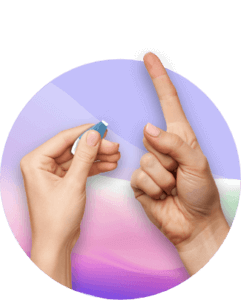
2. Collect your sample
Take your finger prick blood sample at home, or choose to have your blood taken at a Superdrug health clinic or a nurse at home. Return to our NHS lab using our prepaid envelope.
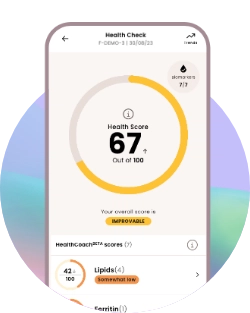
3. View your results
View your results on your secure health dashboard within 2 working days of our lab receiving your sample. Read personalised comments from our GPs.
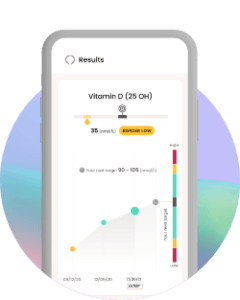
4. Make improvements
With more in-depth results, you will be able to identify areas that need improving. Make the changes and track your progress.
What gets tested?
1 Biomarker Included
Additional biomarkers can be added by personalising this test.
What are biomarkers?
Biomarkers are specific compounds we can detect in your blood sample that reflect different things about your health. Your test will tell you your levels for each of the above biomarkers, and whether they are in a normal range.
Did you know?
Nearly half of UK adults have a vitamin D deficiency
BMJ: Preventable but no strategy: vitamin D deficiency in the UKWhat is vitamin D & what does it do?
Vitamin D is a fat-soluble vitamin that we get from the sun and some foods. It’s responsible for controlling how your body absorbs calcium and phosphate, which are needed for energy, bone growth, and muscle and nerve function. The RDA for vitamin D in the UK is 10 micrograms (400UI) for everyone above the age of 1 (babies under 1 years old need between 8.5-10mg).
What are the symptoms of vitamin D deficiency?
Some symptoms related to low vitamin D levels include fatigue, depression, hair loss, muscle pain and bone pain. We found that 74% of people have vitamin D levels below the optimum range.
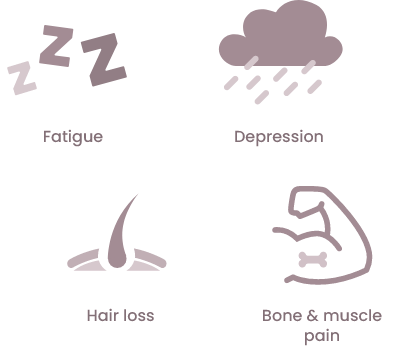
What will a vitamin D test tell me?
Checking your vitamin D levels may help you understand why you feel tired, but other tests, like our Baseline Plus test will give you much greater insight into your health, and can help uncover more than just a vitamin D test.
Frequently asked questions
This is what our customers ask us most about this test. For more information, try our help centre.
How much vitamin D do I need a day?
The recommended daily intake of vitamin D in the UK is 10 micrograms (400UI) for both males and females above the age of 1. In adults, our doctors regularly recommend taking a Vitamin D supplement of 1000IU which is readily available in health food shops and pharmacies, as most of the people we test are very deficient! This is why we recommend tracking your Vitamin D levels.
What foods contain vitamin D?
Many foods in the UK are fortified with Vitamin D. The following foods are great sources of Vitamin D:
- oily fish
- red meat
- liver
- egg yolks
Do I need to take vitamin D supplements?
Whilst we get most of our Vitamin D from exposure to sunlight (Vitamin D is the only vitamin our bodies produce), the UK government understands that 1 in 6 adults have Vitamin D levels below government recommendations. It is important to check your Vitamin D levels using an at home blood test.
How long does it take to recover from vitamin D deficiency?
In the event that someone is deficient in Vitamin D, a doctor may prescribe a “loading dose”. Depending on the dose, it can take up to 10 weeks to resolve a deficiency.
Does vitamin D help with mental health?
Vitamin D is considered a vital factor in mental health such as low mood, depression, and quality of life.
How soon will the test arrive?
If you order your test before midday on a Monday to Friday then your kit will be dispatched
the same day.
All our kits are sent out via Royal Mail first class post, so it should be with you within 1-2
working days.
How secure is my data?
We have strict processes in place to ensure the protection of your data. Following GDPR the company also operates under tight legal rules about the sharing of data which ensures that data is only shared if it is crucial to the delivery of our service. For example, our doctors see customer results at the time of review, however, after review, access to results is withdrawn.
Learn more about your data security.
Can I have someone take my blood for me?
Yes. We offer two options if you do not want to do our finger prick test. The first is a home appointment where a nurse comes to your home to take a blood sample. The second is to visit a Phlebotomy clinic near you that offers a blood sample service.
A blood sample will be taken from your vein and we will provide you with everything you need to give to the nurse to allow them to take the sample.
The nurse will give you the blood sample to return to us using the pre-paid envelope provided.
Does a doctor review my results?
We have a team of doctors and nurses who look at all results and will comment on any results that are outside of the normal range for your age.
Can I download the results to share with my GP?
Yes, you can download your results from your health dashboard as a PDF to share with your GP.
Learn how to export your results.
We are dedicated to supporting you on improving your health
Go to help center
Vitamin D Blood Test, recommended by our doctors
"The majority of the UK population have insufficient vitamin D levels. It's a nutrient that is essential for bone health, immune function, and overall well-being. Low levels can lead to conditions like osteoporosis and immune system issues. Use this test for assessing baseline levels and the efficacy of any dietary changes or supplementation"
Dr Thom Phillips
Similar tests
- Health scores calculated
Close
We're changing people's lives
How our Vitamin D Blood Test works
Getting the insights you need to improve your health has never been easier.

1. Choose your blood test
No need to wait for a GP appointment, choose from our wide range of tests which come with everything you need to take your sample and return to our lab.

2. Collect your sample
Take your finger prick blood sample at home, or choose to have your blood taken at one of our partner clinics or a nurse at home. Return to our NHS lab using our prepaid envelope.

3. View your results
View your results on your secure health dashboard within 2 working days of our lab receiving your sample. Read personalised comments from our GPs.

4. Make improvements
With more in-depth results, you will be able to identify areas that need improving. Make the changes and track your progress.
What's included in this test?
1x Yellow Tube
3x Lancets

1x Cleansing wipes

Plasters

2x Alcohol swabs
1x Return pouch

1x Tracked 24 return envelope

1x Lab request form
Blood sample kit
Results within 2 working days
Tracked 24 delivery & return
Secure health dashboard
Accredited lab analysis
Doctor reviewed results
Our impact in numbers...
70+
From hormones to nutrients, we offer 70+ different tests
60,000+
We've helped over 60,000 people improve their health
800,000+
We've delivered over 800,000 test results
Related articles
Like this article? Here are some more based on similar topics.
Vitamin D Blood Test

